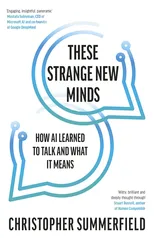As If Human
Ethics and Artificial Intelligence
(Autor) Nigel ShadboltA new approach to the challenges surrounding artificial intelligence that argues for assessing AI actions as if they came from a human being Intelligent machines present us every day with urgent ethical challenges. Is the facial recognition software used by an agency fair? When algorithms determine questions of justice, finance, health, and defense, are the decisions proportionate, equitable, transparent, and accountable? How do we harness this extraordinary technology to empower rather than oppress? Despite increasingly sophisticated programming, artificial intelligences share none of our essential human characteristics--sentience, physical sensation, emotional responsiveness, versatile general intelligence. However, Nigel Shadbolt and Roger Hampson argue, if we assess AI decisions, products, and calls for action as if they came from a human being, we can avert a disastrous and amoral future. The authors go beyond the headlines about rampant robots to apply established moral principles in shaping our AI future. Their new framework constitutes a how-to for building a more ethical machine intelligence.
Nigel Shadbolt
Nigel Shadbolt is a renowned computer scientist, AI researcher, and professor at the University of Oxford. He is best known for his work in the field of open data and artificial intelligence. Shadbolt co-founded the Open Data Institute and has been a leading advocate for making data more accessible and transparent.
His most notable work includes co-authoring the book "The Spy in the Coffee Machine," which explores the impact of AI on society. Shadbolt's writing style is clear, informative, and engaging, making complex concepts accessible to a wide audience.
Shadbolt's contributions to literature have had a significant impact on the field of AI and data science, influencing how we think about the ethical and societal implications of these technologies. His work continues to shape discussions and policy around data privacy and transparency.




